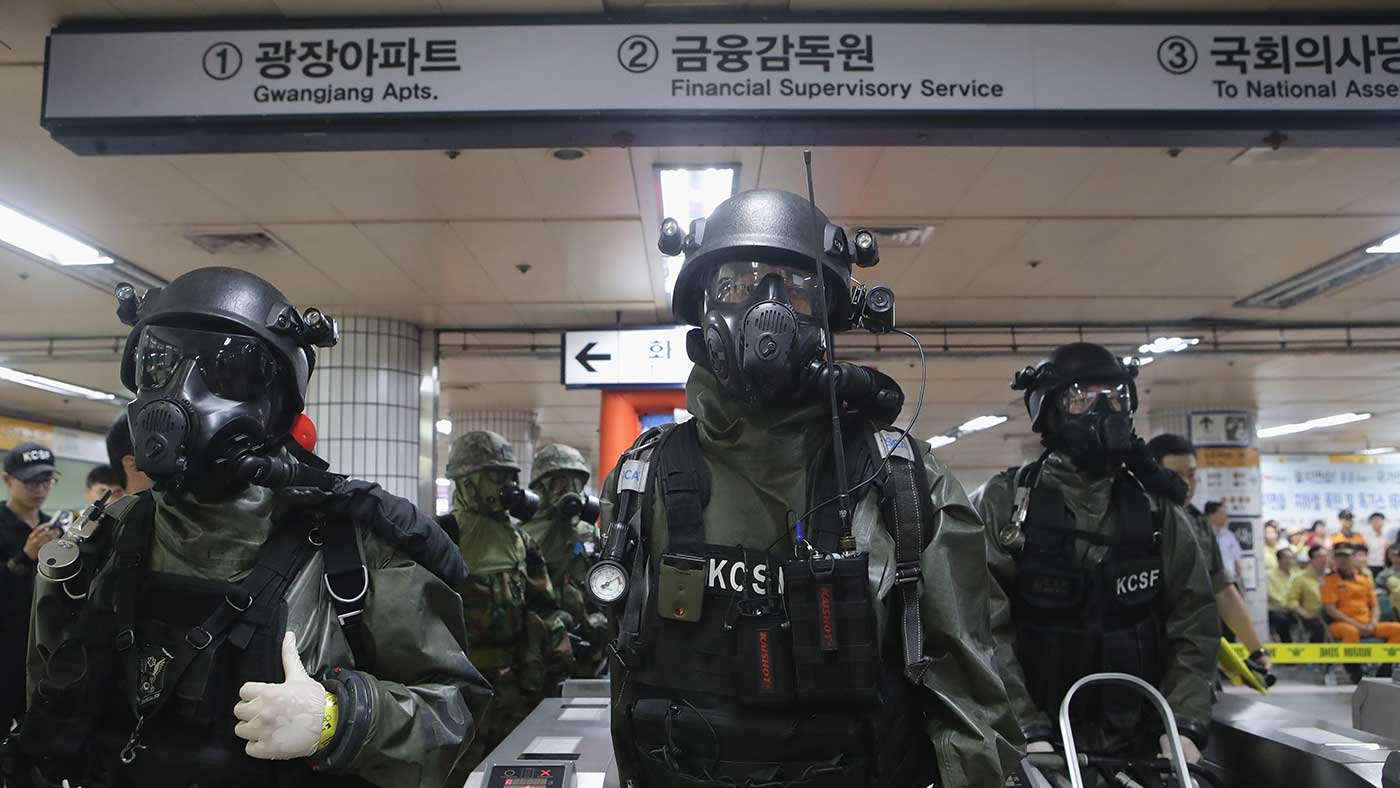North Korea rails against US military exercises
The joint drill with South Korea will go ahead despite threats from Pyongyang

A free daily email with the biggest news stories of the day – and the best features from TheWeek.com
You are now subscribed
Your newsletter sign-up was successful
The US and South Korea have begun their annual joint military exercises, despite escalating tensions with North Korea.
US officials say the exercises are intended to ensure readiness for an attack by Kim Jong-un, but Pyongyang has characterised them as preparation for an invasion.
It said the drills were "pouring gasoline on fire" and "driving the situation into the uncontrollable phase of a nuclear war", CNN reports.
The Week
Escape your echo chamber. Get the facts behind the news, plus analysis from multiple perspectives.

Sign up for The Week's Free Newsletters
From our morning news briefing to a weekly Good News Newsletter, get the best of The Week delivered directly to your inbox.
From our morning news briefing to a weekly Good News Newsletter, get the best of The Week delivered directly to your inbox.
Two weeks ago, after Donald Trump threatened to meet Kim's threats with "fire and fury like the world has never seen", North Korea announced plans to fire missiles at the US territory of Guam. Since then, both sides have toned down their rhetoric, but "the ten-day drills, known as Ulchi Freedom Guardian, will test whether North Korea's apparent easing of its immediate threat to Guam proves durable," says The Australian.
Previous drills have resulted in increased tensions between North and South Korea. In 2015, the exercises resulted in the exchange of artillery fire between the two countries across the demilitarised zone that separates them.
"South Korea usually deploys about 50,000 troops while the US typically sends 25,000 to 30,000 soldiers," says the BBC.
North Korean threats prompt Japan to install missile defence
17 August
A free daily email with the biggest news stories of the day – and the best features from TheWeek.com
Japan has announced plans to put in place a new land-based missile defence system in the wake of continuing threats of attack by North Korea.
The system – known as "Aegis Ashore" – will help bolster a defence framework that Tokyo has acknowledged could be "woefully inadequate", says the Straits Times.
The plans for Aegis have not yet been submitted for budgetary funding, but amid increasing concerns about hostilities from Pyongyang, the country's Ministry of Defence has pushed forward the deployment of the system. Japan's foreign ministers are expected to discuss the plans with Washington later today.
Each unit of Aegis is believed to cost up to 80 billion yen (£564 million), and can intercept ballistic missiles mid-flight, The Times says.
Japan also plans to introduce a "space unit" to "protect satellites that Japan and the US rely on to detect North Korean missile launches", the paper adds.
Last week, Tokyo said the North Korean regime under leader Kim Jong-un poses a "new level of threat" to peace in east Asia. Japan has scheduled tests for its new emergency alert loudspeaker system in nine prefectures tomorrow.
The news comes after two recent missile tests by North Korea, which the rogue state claims are capable of delivering a nuclear warhead to mainland US. This led to a dramatic escalation in rhetoric between the two nations.
Last week, North Korea threatened to fire four missiles into waters around the US island territory of Guam in the Pacific Ocean, in response to President Trump's assertion that any aggression from Pyongyang would be met with "fire and fury".
Trump: North Korea military solutions 'locked and loaded'
11 August
Six B-1B "Lancer" bombers are on standby in the Pacific island of Guam in case Donald Trump decides to order a preemptive attack on North Korea's nuclear sites, says NBC News, citing four military sources.
The bombers, stationed in the US Andersen Air Force base 2,100 miles from North Korea, are one of several military options being considered. Air, land, sea and cyber action are also possible, says NBC.
The target would be "approximately two dozen North Korean missile-launch sites, testing grounds and support facilities," says the broadcaster.
US President Donald Trump took to Twitter today to confirm that military solutions are "now fully in place, locked and loaded, should North Korea act unwisely".
So far hostilities have been limited to a war of words between Donald Trump and North Korea's leader Kim Jong-un. But as the rhetoric escalated this week, the US reportedly asked Britain's Royal Air Force to help them spy on North Korea's nuclear bases in order to find Kim's missile stocks, says the Daily Mirror.
"The RAF has been asked to join an international spy operation over the rogue state to pinpoint nuclear sites and artillery batteries," the Mirror says, adding that if the UK parliament approves the request at least one of Britain's three Rivet Joint spy planes could fly to a base in Japan within two weeks.
North Korea is threatening to send medium to long-range strategic ballistic missiles to strike the area around Guam, home to the US Andersen Air Force base and thousands of US servicemen, the state-run news agency KCNA reports.
US Secretary of Defense James Mattis says the US is ready for both offensive and defensive missions.
"Our State Department is making every effort to resolve this global threat through diplomatic means," Mattis said in a written statement, adding "[but] it must be noted that the combined allied militaries now possess the most precise, rehearsed and robust defensive and offensive capabilities on Earth."
-
 The environmental cost of GLP-1s
The environmental cost of GLP-1sThe explainer Producing the drugs is a dirty process
-
 Greenland’s capital becomes ground zero for the country’s diplomatic straits
Greenland’s capital becomes ground zero for the country’s diplomatic straitsIN THE SPOTLIGHT A flurry of new consular activity in Nuuk shows how important Greenland has become to Europeans’ anxiety about American imperialism
-
 ‘This is something that happens all too often’
‘This is something that happens all too often’Instant Opinion Opinion, comment and editorials of the day
-
 New START: the final US-Russia nuclear treaty about to expire
New START: the final US-Russia nuclear treaty about to expireThe Explainer The last agreement between Washington and Moscow expires within weeks
-
 Would Europe defend Greenland from US aggression?
Would Europe defend Greenland from US aggression?Today’s Big Question ‘Mildness’ of EU pushback against Trump provocation ‘illustrates the bind Europe finds itself in’
-
 Greenland, Colombia, Cuba: where is Donald Trump eyeing up next?
Greenland, Colombia, Cuba: where is Donald Trump eyeing up next?Today's Big Question Ousting Venezuela’s leader could embolden the US administration to exert its dominance elsewhere
-
 Did Trump just end the US-Europe alliance?
Did Trump just end the US-Europe alliance?Today's Big Question New US national security policy drops ‘grenade’ on Europe and should serve as ‘the mother of all wake-up calls’
-
 Trump peace deal: an offer Zelenskyy can’t refuse?
Trump peace deal: an offer Zelenskyy can’t refuse?Today’s Big Question ‘Unpalatable’ US plan may strengthen embattled Ukrainian president at home
-
 Vladimir Putin’s ‘nuclear tsunami’ missile
Vladimir Putin’s ‘nuclear tsunami’ missileThe Explainer Russian president has boasted that there is no way to intercept the new weapon
-
 Russia’s war games and the threat to Nato
Russia’s war games and the threat to NatoIn depth Incursion into Poland and Zapad 2025 exercises seen as a test for Europe
-
 What will bring Vladimir Putin to the negotiating table?
What will bring Vladimir Putin to the negotiating table?Today’s Big Question With diplomatic efforts stalling, the US and EU turn again to sanctions as Russian drone strikes on Poland risk dramatically escalating conflict